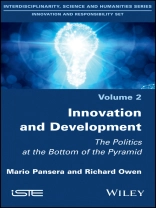Innovation, often tempered by the language of inclusion, has become an indispensable element of contemporary development policy and practice in the so-called Global South. Driven by multinational companies, public-private partnerships and social enterprises, ‘innovation for development’ aims to co-produce social goods (things of value) such as poverty alleviation with associated profit through innovative market-led solutions, opening up untapped and unserved markets in the developing world and exploiting the potential ‘fortune at the bottom of the pyramid’. But innovation for development is a contested notion with the capacity to shelter multiple political agendas.
By reviewing existing academic theory and discussing four in-depth case studies from Bangladesh and India, this book interrogates how innovation for development is being framed, its politics and the impacts it is having on rural communities on the ground. The analysis suggests both an emerging hegemony constructed around a neoliberal, market-led agenda and the existence of countervailing voices that question this framing, sometimes radically so.
Зміст
List of Acronyms ix
Preface xi
Introduction xv
Part 1. Theoretical Foundations: Innovation for Development, the Rise of a New Discourse 1
Chapter 1. The Project of Development as a Discourse 3
1.1. Discourses, framings and narratives 4
1.1.1. The order of the discourse 4
1.1.2. Framings and narratives 7
1.2. Development as a discourse: underdevelopment and ‘the others’ 9
1.2.1. After post-development: the contemporary situation 15
1.2.2. Technology, innovation and development: a contested political field 18
1.3. Conclusion 20
Chapter 2. The Cross-fertilization of Innovation into the Lexicon of Development 23
2.1. Economic development and the role of innovation 25
2.1.1. Growth theories and innovation 25
2.1.2. Evolutionary theory and innovation systems 27
2.1.3. Innovation systems and developing countries 29
2.2. Reviewing the innovation and development literature 32
2.2.1. Resource-constrained innovation (RCI): bricolage, frugality and jugaad 34
2.2.2. The fortune at the Bottom of the Pyramid 38
2.2.3. Critics of the BOP approach 40
2.2.4. Appropriate technology and grassroots innovations 41
2.2.5. ‘Inclusion’: an emerging discursive bridge 45
2.3. Conclusions 47
Part 2. Learning from the Field 53
Introduction to Part 2 55
Chapter 3. The Tale of the Poor as Market-led Consumers. 57
3.1. Grameen Shakti 58
3.1.1. Creating resource-constrained innovation 60
3.1.2. The green sub-narrative 65
3.1.3. Institutional weaknesses and voids. 68
3.1.4. Empathy and creating social value 69
3.2. Grameen Shakti’s overall innovation and development narrative 71
3.3. Conclusion 76
Chapter 4. The Tale of the Poor as Market-led Co-producers 79
4.1. The case of Mother Earth 80
4.1.1. The Industree ecosystem 80
4.1.2. The problems of rural production 84
4.1.3. Transforming production 87
4.1.4. Mother Earth’s educating mission 89
4.2. Mother Earth’s overall innovation and development narrative 93
4.3. Conclusion 98
Chapter 5. The Tale of ‘Inclusive Business Models’ 99
5.1. The case of the Indian Institute of Management Bangalore (IIMB) 100
5.1.1. IIMB’s mission as a project of Western-inspired modernity 100
5.1.2. An ‘Indian way to modernity’ 105
5.1.3. Inclusive business models and inclusive innovation 107
5.2. IIMB’s overall innovation and development narrative 110
5.3. Conclusion 114
Chapter 6. The Tale of Science, Technology and Innovation for Social Revolution 117
6.1. The case of the People’s Science Movements (PSMs) 118
6.1.1. Competing narratives of science, technology and development in independent India 118
6.1.2. Pro-poor innovation for productive networks 121
6.1.3. Innovation as a political artifact 126
6.2. The People’s Science Movements’ overall innovation and development narrative 131
6.3. Conclusion 133
Chapter 7. The Politics at the Bottom of the Pyramid 135
7.1. Words, meanings and politics 137
7.1.2. Comparing the case studies 138
7.2. Self-help and inclusion: key buzzwords connecting innovation to development 144
7.2.1. Self-help 144
7.2.2. Inclusion 146
7.2.3. Some important limitations 147
7.3. Closing thoughts 149
Epilogue 153
References 155
Index 179
Про автора
Mario Pansera is a Research Fellow at the University of Bristol, UK. His research focuses on discourses of innovation and development in the Global South, Responsible Research and Innovation (RRI) and Innovation for Sustainability.
Richard Owen is a Professor of Innovation Management at the School of Management, University of Bristol, UK. He researches innovation as a future-creating, socially constructed and politically and ethically entangled phenomenon from a critical and interdisciplinary perspective.












